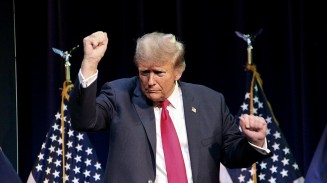(Photo : Getty Images/Spencer Platt)
The Consumer Financial Protection Bureau (CFPB), targeted by a lawsuit on Thursday, faces opposition from banking entities and the U.S. Chamber of Commerce over its rule to cap credit card late fees at $8. This litigation, lodged in Fort Worth, Texas's federal court, accuses the bureau of overreaching its mandate and sidestepping Congress's guidelines, which stipulate that fees must be substantial enough to prevent late payments, ensure accountability among cardholders, and enable issuers to recover costs associated with delays in payments.
Legal Battle Over $8 Cap
The pushback against the CFPB's decision brings into focus a simmering debate over the regulation of late fees. Among the plaintiffs are influential groups such as the Chamber, the American Bankers Association, the Consumer Bankers Association, and three Texas-based trade associations. These institutions argue that the cap will inflict irreversible damage, heightening card losses and operational costs for issuers, consequently affecting even those customers who consistently meet their payment deadlines.
Defending Consumer Interests
Despite the backlash, the CFPB remains adamant about its stance on the rule. The bureau asserts that the initiative aims to close a gap exploited by credit card companies to profit significantly from late fees. By implementing the cap, the CFPB estimates a potential saving of over $10 billion for American consumers, shedding light on the substantial revenue that issuers have historically generated from late fees - a sum exceeding $14 billion in 2022 alone, with the average fee ballooning to $32.
This new rule applies to credit card issuers with over 1 million open accounts. They must justify any need for fees surpassing the $8 mark to cover their costs, drawing scrutiny towards what the bureau identifies as misuse of an automated inflation adjustment feature. This regulation will influence over 95% of all outstanding credit card balances.
ALSO READ: IRS Confirms $7,000 Earned Income Tax Credit for Millions of Americans - Check Your Refund This March!
Implications of the Cap on Late Fees
The legal dispute raises critical questions about the efficacy and fairness of limiting late fees. Neil Bradley, the Chamber's chief policy officer, mentioned that the CFPB's findings suggest that the repercussions of restricting late fees would inevitably lead to a distribution of related costs across the board, affecting all credit card users, including the punctual payers.
The contention with the $8 cap underscores the banking sector's reliance on late fees as a deterrent and a significant revenue stream. The move challenges the conventional fiscal dynamics of the credit card industry, proposing a shift that could redefine the balance between profitability for issuers and financial fairness for consumers.
Assigned to a Familiar Judge
U.S. District Judge Reed O'Connor oversees the case. O'Connor is an appointee of former President George W. Bush. He has a track record of rulings that have drawn significant attention. One notable ruling involved the Affordable Care Act, also known as Obamacare. O'Connor declared the act unconstitutional, which was later overturned on appeal. With this history, O'Connor now handles this legal challenge against the CFPB. The outcome hinges on a judge known for landmark decisions.
Situated at the intersection of consumer protection, regulatory authority, and the banking sector's operational frameworks, this lawsuit encapsulates a pivotal moment for all stakeholders involved. The clash over the $8 late fee cap scrutinizes the extent of the CFPB's regulatory powers. It sets the stage for a broader debate on the implications of such financial regulations on consumer welfare and industry practices. As the proceedings unfold, the repercussions will likely resonate far beyond the courtroom, affecting the financial habits and policies surrounding credit card usage across the United States.
RELATED TOPIC: Debit Card 'Swipe Fee' Rule Under Scrutiny by Supreme Court Following North Dakota Store's Bid
© 2023 Lawyer Herald All rights reserved. Do not reproduce without permission.
Get the Most Popular Lawyerherald Stories in a Weekly Newsletter





